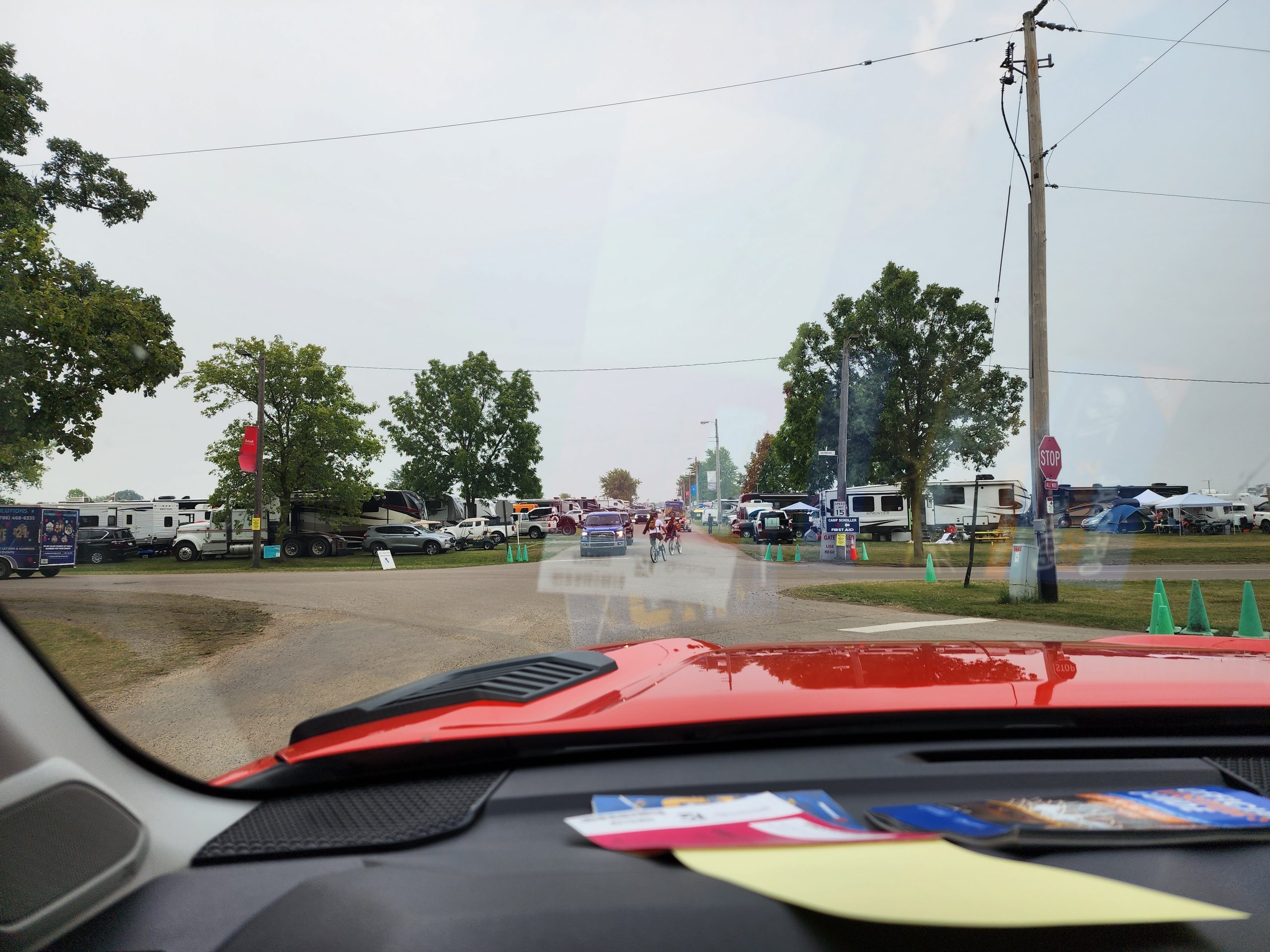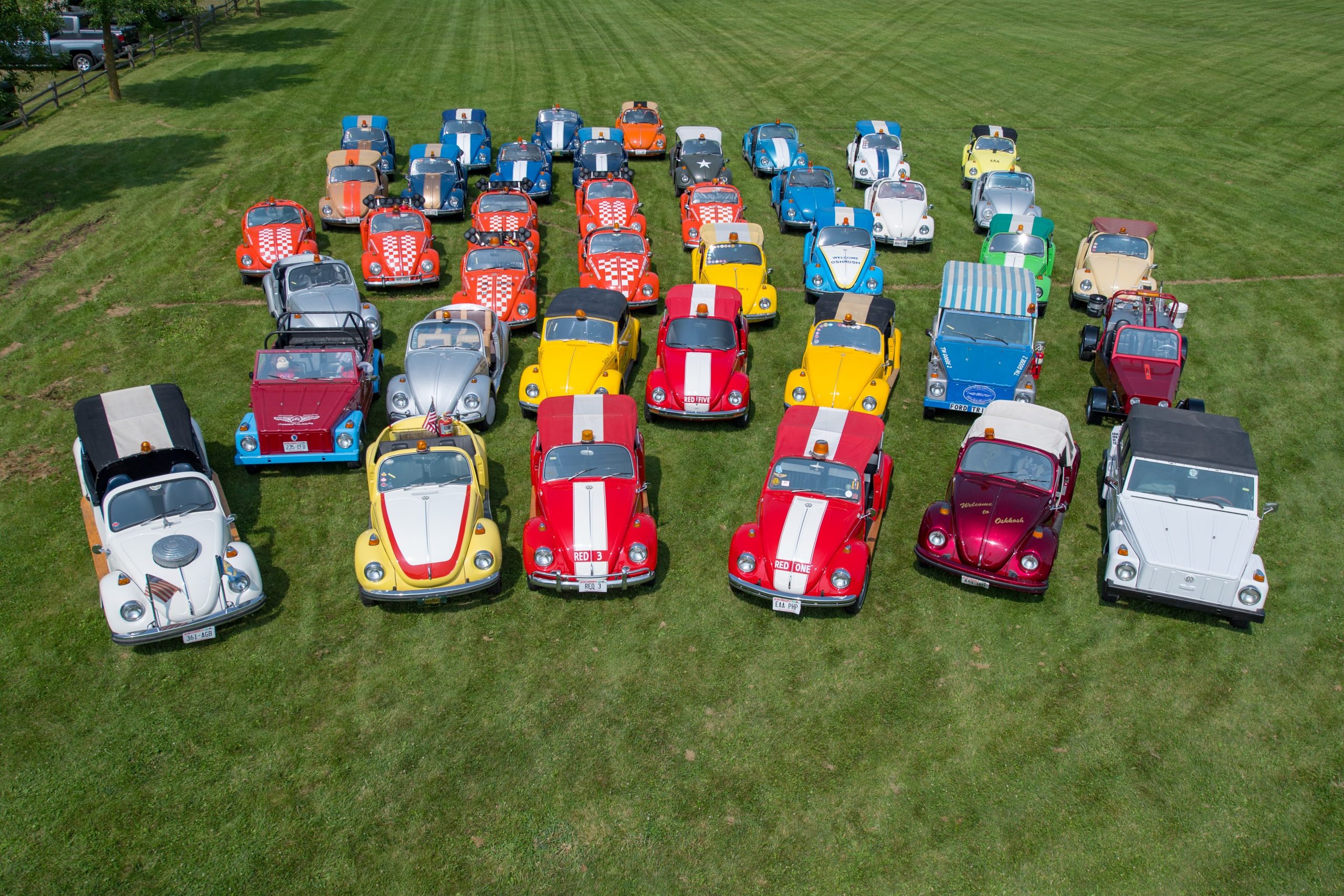The 70th Experimental Aircraft Association AirVenture Oshkosh Fly-In is well underway. The aircraft I’ve seen thus far on just one day here have been phenomenal and the history is even better. Don’t worry, I will get to those planes in time! Today, I want to talk about something I’ve been waiting literally a year to show you. When you go to an AirVenture, you’ll almost certainly see a variety of vehicles without roofs buzzing about. A lot of them are old Volkswagen Beetles but some are chopped-up minivans and the like. What’s the deal? Why do EAA’s staff and volunteers drive around in perma-convertibles? The answer relates to getting around this gargantuan event and the blazing hot summers the fly-in takes place in.
Last week, I wrote about how much of the show takes place on grounds nearby a pair of runways that are both over a mile long. Something I neglected to mention is the fact that literally everything having to do with this show is nearly incomprehensible in scale. In 2022, there were 10,000 planes at AirVenture and there were 12,000 campsites used. As a handful of EAA staff have told me, this year is shaping up to be an even bigger record than last year. When Sheryl and I arrived at Camp Scholler on Monday night, we were greeted by a frantic frenzy of traffic in every direction.

It seemed nobody really obeyed traffic signs and there were people just everywhere. Pulling our camper through the madness was actually a bit stressful as I had to watch out for scooters, bicycles, motorcycles, and other wheeled contraptions sort of just going wherever they wanted to.
Controlled Chaos
As it turned out, some of this is because by Monday, Camp Scholler was completely sold out with all several thousand campsites occupied. The rest of us had to set down our campers and tents in fields next to the property. That’s where my family’s 2007 Thor Adirondack 31BH sits right now.

You’ll probably notice the bright orange 2023 Tacoma TRD Pro i-Force Max parked in front of it. Yes, you’ll read about that bad boy, too!
Based on all of this, you would be right if you assumed navigating AirVenture is quite the undertaking. Last year, Sheryl and I attended the final weekend of the show and despite nearly non-stop walking up and down miles of flightline, we didn’t see nearly everything. That’s why we’ve given ourselves the whole week this time. Today, we’ve made it past the Vintage area and to Boeing Plaza, that’s it!
When EAA staff and volunteers need to get around the temporary city, you’ll see them driving an assortment of vehicles ranging from scooters and UTVs to a buggy and even an old GM dustbuster van. The most striking of the bunch are the topless air-cooled Beetles.

EAA’s people use these vehicles to zip around the event far faster than using one of the trams or walking. When I first laid eyes on one of these cars I wondered why they’re all chopped up. They’re often seen scooting down the grass next to the runways, so I assumed they maybe existed for visibility or maybe for camera work.
Instead, the reason has to do with hot Wisconsin summers. Amusingly, Jason has begged for a story about these cars for a year now [Editor’s Note: I wrote about these at the Old Site years ago, but I’m excited to get this update from someone who has actually seen them! – JT], so finally, you get to read it!
The Hot Reason Behind These Cars

In January 1953, the Experimental Aircraft Association was created when founder Paul H. Poberezny assembled a group of aviation geeks in his basement. EAA was originally founded to support pilots in building their own planes and that same year, it held its first fly-in at Curtiss-Wright Airport in Milwaukee. The original fly-in was comparatively small-about 150 people and 21 planes-but every year, more people touched down to enjoy aviation. By 1959, EAA had to move its Fly-in Convention to Rockford, Illinois. Even that didn’t last very long as by 1969, EAA had to expand even further. This time, Oshkosh, Wisconsin was the chosen location.
As EAA writes, when the show launched in Oshkosh in 1970, Poberezny needed a way to get around the convention. His vehicle of choice was his own personal sedan. Apparently, this didn’t go over very well as someone wondered if Poberezny should be able to ride around in air-conditioning when EAA members were not able to. I get the complaint for sure. Right now, it’s 89 degrees outside with 50 percent humidity. On Thursday, it’s going to be 92 degrees or even hotter. Late-July heat in Wisconsin is not a joke!
Poberezny agreed with the complaint and responded with a solution that is now EAA tradition.

He reached out to Will Schaick, a volunteer, to find a Beetle that he could still drive around in but still be exposed to the elements. Schaick found an old Beetle [Editor’s Note: It looks like this one is a ’68 – JT] in a scrapyard and rescued it from death, just to have its roof chopped off, doors removed, and the remaining body painted bright red. Poberezny loved the car so much that he asked for ten more just like it. The first car would later be named the Red One I.

EAA says that the cars have multiplied over time and the fleet grew to include about 40 of them:
One of those 10 was an automatic, which ended up suiting Paul’s needs better. That Bug became Red One II, and Red One I was transitioned to serving as Orange One after a paint job. Orange One found plenty of work as the lead flightline operations vehicle.
After one more switch to an even-more improved Red One III during the 1972 convention, Paul’s vehicle of choice was set, with Red One II also going to flightline ops. Over the years, through both donations and savvy purchases, the fleet of Beetles grew from 11 to around 40.

[Editor’s Note: It’s interesting how few of these are actually factory convertibles, which you would think would be a lot easier to use for the open-driving purposes they want. In fact, in this picture above of 40 Beetles (and three Type 181 Things, and that custom-built buggy) only one – the yellow one between the red one with the white stripe and the silver one in the second row – appears to be a Karmann-built VW factory convertible. My guess is that Beetle sedans are just far more plentiful and cheaper than the convertibles are. Also, is that a trash can set into the trunk of the white one on the lower left of that picture?– JT]
The Beetles aren’t the only vehicles, either. Another notable operations vehicle is the Smoke Oil Car. This used to be a 1966 Buick Special, but in 2016, the Buick was replaced by a custom-built VW-based buggy. During air shows, some aircraft will deploy dazzling contrails. Before those planes get into the sky, they need to have their smoke oil reservoirs filled. This little buggy was built to carry two 55-gallon drums of the stuff to fill up stunt planes before they go into the sky.

Still Practical After All Of These Years
The Beetles are color-coded, too.

Orange topless Beetles are the ones you’ll see racing down the flightline, green Beetles will be driven by the communications team, white Beetles for departure briefings, blue Beetles for airplane greeters, and yellow Beetles for security. Think of these cars as like a John Deere Gator decades before that was even a thing.
EAA notes that each year, the Bugs need a ton of work before getting put out there in the air show, but the organization’s staff and volunteers include a crew of skilled wrenchers. Check out this short by AVweb on how EAA Maintenance keeps them alive. The Beetles get new spark plugs every year and it takes a month to prep them for AirVenture:
The organization says that the cars aren’t just for show, either. Staff still use these cars in their day-to-day work and they help get people to different places quickly. These cars also help people on the grounds when they need to speak to staff; it’s hard to miss a bright Bug, after all. Still, they do have some star appeal, from EAA director of communications, Dick Knapinski:
“I’ve had one now for better than 20 years,” Dick said. “It’s absolutely essential to what we do, but being part of the culture and having that fun factor, that’s great too.”
“There’s the fun, there’s the practicality, and there’s the number of stories I’ve heard from people,” he said. “I’ve had Apollo astronauts riding in the Bug. I have had B-25 pilots riding in the Bug. I’ve had people with magnificent stories, and I don’t know how many kids have ridden in the Bug with their families.”

So, the next time you’re at AirVenture and see some old, topless cars rolling around, you now know why. The modifications to these little cars technically have nothing to do with planes, but with the blazing-hot Wisconsin summer. Hopefully, EAA keeps the little cars going because they are pieces of history of their own among the old birds in the show.




(Images: Author, unless otherwise noted.)
Support our mission of championing car culture by becoming an Official Autopian Member.





Never underestimate the utility of not having doors. I love parking lots in the summertime with my doorless Wrangler.